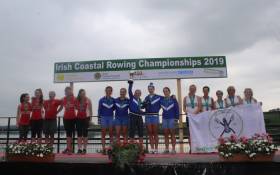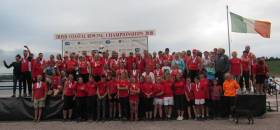Displaying items by tag: Irish Coastal Rowing Championships
#Coastal Rowing: Myross won the senior men’s title for the second weekend in-a-row at the Irish Coastal Rowing Championships at the National Rowing Centre. The had also won at the ICRF All-Ireland. Killorglin won the senior women’s crown.
In excellent conditions, the contest for the Club of the Championships was close. The prize goes to the club with the most wins. Holders Kilmacsimon could have taken it with wins in the final two races but were denied and Whitegate, the hosts, were crowned champions.
Wonderful Day for Kilmacsimon at Irish Coastal Rowing Championships
#CoastalRowing: Kilmacsimon emerged with an outstanding seven wins at the inaugural Irish Coastal Rowing Championships at the National Rowing Centre. Cork clubs were dominant at the event. Ring, with three wins, were the closest challengers to Kilmacsimon, which became the Club of the Championships. Kilmacsimon is based on the River Bandon in west Cork.
Irish Coastal Rowing Championships, National Rowing Centre, Cork (Selected Results; winners of finals)
Saturday
Men
Open Sprint: Myross
Timber Yawl: Kilmacsimon
Open Classic: Myross
Women
Open Sprint: Castletownbere
Timber Yawl: Galley Flash
Open Classic: Castletownbere
Mixed
Masters: Passage West
Sunday
Men
Coastal Four – Senior: Galley Flash. Inter: Blackrock. Under-21; Kilmacsimon. Junior: Myross. Jun 18: Ring. Jun 16: Courtmacsherry A. Pre-Veteran: Blackrock A. Veteran: Whitegate. Masters: Kilmacsimon.
Women
Coastal Four – Senior: Galley Flash. Inter: Killurin. Under-21: Kilmacsimon and Killorglin (tie). Jun: Rushbrooke. Jun 18: Kilmacsimon A. Under-16: Portmagee A. Pre-Veteran: Ring. Veteran: Kilmacabea. Masters: Rushbrooke.
Mixed
Coastal Four – Senior: Kilmacsimon. Pre-Veteran: Ring. Veteran: Castletownbere A.
#CoastalRowing: Castletownbere and Myross both won on the double at the Irish Coastal Rowing Championships at the National Rowing Centre in Cork today. There was a big entry, especially at underage level, and multiple heats. There is an extensive set of finals scheduled for tomorrow, Sunday.
Irish Coastal Rowing Championships, National Rowing Centre, Cork (Selected Results; winners of finals)
Men
Open Sprint: Myross
Timber Yawl: Kilmacsimon
Open Classic: Myross
Women
Open Sprint: Castletownbere
Timber Yawl: Galley Flash
Open Classic: Castletownbere
Mixed
Masters: Passage West

























































